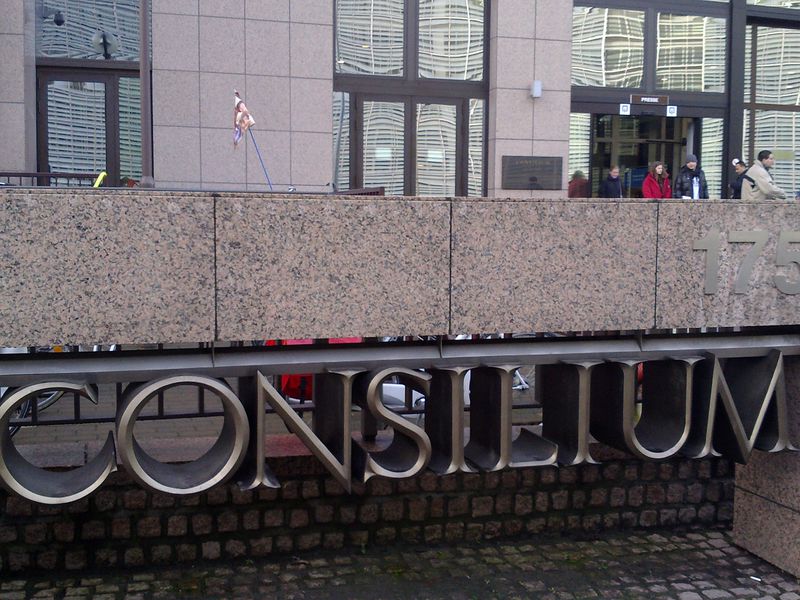Serbia's Stakes
Adelina Marini, December 9, 2011
 The Western Balkans are again getting under the spotlight for the EU summit, while in the same time they managed to attract the attention of the foreign ministers of NATO, who are also meeting in Brussels. This time, however, the message is different. The region is no longer a threat for Europe's security, but it has a lot other problems to solve. This is why NATO in particular will go ahead with its main priority - Afghanistan at the moment, but also its relations with Russia, while the EU has to take the hot potato and decide what to do with it. Although in the range of vision of these two big and strategically important organisations the entire region is included, the main focus falls on Serbia and Kosovo.
The Western Balkans are again getting under the spotlight for the EU summit, while in the same time they managed to attract the attention of the foreign ministers of NATO, who are also meeting in Brussels. This time, however, the message is different. The region is no longer a threat for Europe's security, but it has a lot other problems to solve. This is why NATO in particular will go ahead with its main priority - Afghanistan at the moment, but also its relations with Russia, while the EU has to take the hot potato and decide what to do with it. Although in the range of vision of these two big and strategically important organisations the entire region is included, the main focus falls on Serbia and Kosovo.
Firstly because the two countries have a lot of unresolved problems and are a source of tension in the region and Europe, and secondly, because their future in both organisations is still unclear.
Serbia's European future
From the meeting of EU leaders on Thursday and Friday Belgrade expects to receive approval for the European Commission proposal from October to start accession negotiations. Yet then, however, the Commission firmly stated that this could and should happen under one condition - if the dialogue Belgrade-Pristina is going well and, most of all, if the agreements are applied in practise. Something that until recently was not the case. It was very recently when Boris Tadic, Serbia's president, called on the Serbs in Northern Kosovo to remove the road blocks and go home, which, though, is happening literally in the 11th hour and obviously is failing to convince anybody, because in her speech in the Bundestag on December 2nd Chancellor Angela Merkel stated, quite firmly, that Serbia was not ready to start negotiations.
The ministers of foreign affairs of the Union, however, in the framework of the General Affairs Council (GAC) on December 5th came up with very thorough conclusions on the matter. It could be said that two thirds of the final document was dedicated to enlargement and the Western Balkans, and Serbia and Kosovo occupy a significant part of it. But the key sentence is the following: "In light of the progress achieved so far by Serbia and taking note that Serbia has already reengaged in the dialogue and is moving swiftly to the implementation in good faith of agreements reached, the Council takes note of the positive assessment of the Commission
and the recommendation to grant candidate status which will be considered by the
European Council, in line with established practise. The Council expects Serbia to address the question of regional cooperation".
Thus formulated this sentence does not give a very clear idea whether the countries will support the start of negotiations with Serbia, but further on it is pointed out that the Council notes that the start of membership talks will be "considered by the
European Council, in line with established practise, once the Commission has assessed that Serbia has achieved the necessary degree of compliance with the membership criteria, in particular the key priority of taking steps towards a visible and sustainable improvement of relations with Kosovo, in line with the conditions of the Stabilisation and Association Process". It is also pointed out that Serbia is expected to cooperate actively with EU's civil mission EULEX.
GAC also notes one more thing - that the reforms momentum must be maintained regarding the necessary extent of compliance with membership criteria, including the permanent implementation of the adopted legislation, especially in the area of rule of law. Special attention must be paid to non-discriminatory treatment of national minorities and to improving business environment.
Serbia and NATO
"The situation in Kosovo is a cause of concern", this is how Alliance's Secretary  General Anders Fogh Rasmussen started his news conference at the end of the first day of NATO's December Ministerial on December 7th, which discussed the situation in Kosovo very profoundly. He added that the restriction of the right of movement was unacceptable and sent an indeed very strong message to Serbia to remove the blockades and to ensure freedom of movement. Similarly to the EU, NATO's foreign ministers also stress that it is important not only agreements to be achieved but to ensure real and tangible results. According to minister Nickolay Mladenov (minister of foreign affairs of Bulgaria), who also took part in the meeting, a strong political dialogue in Kosovo was needed that would allow the integration of Serbs in Northern Mitrovica. This, however, cannot happen with administrative measures only, but with a political conversation about the range of a "possible autonomy", as is envisaged in the Ahtisaari plan, agreed before Kosovo announced its independence.
General Anders Fogh Rasmussen started his news conference at the end of the first day of NATO's December Ministerial on December 7th, which discussed the situation in Kosovo very profoundly. He added that the restriction of the right of movement was unacceptable and sent an indeed very strong message to Serbia to remove the blockades and to ensure freedom of movement. Similarly to the EU, NATO's foreign ministers also stress that it is important not only agreements to be achieved but to ensure real and tangible results. According to minister Nickolay Mladenov (minister of foreign affairs of Bulgaria), who also took part in the meeting, a strong political dialogue in Kosovo was needed that would allow the integration of Serbs in Northern Mitrovica. This, however, cannot happen with administrative measures only, but with a political conversation about the range of a "possible autonomy", as is envisaged in the Ahtisaari plan, agreed before Kosovo announced its independence.
 "We have to be peremptory clear that borders do not change, that borders are final and all decisions that are sought for will be in the framework of these borders", Minister Mladenov clarified, adding that this wording had received strong support by the other NATO ministers.
"We have to be peremptory clear that borders do not change, that borders are final and all decisions that are sought for will be in the framework of these borders", Minister Mladenov clarified, adding that this wording had received strong support by the other NATO ministers.
From Bulgaria's foreign minister's words, from those of the Pact's secretary general, as well as those of Secretary of State Hillary Clinton it becomes clear that Serbia has not much of a choice but to cooperate. What can be noticed in the Alliance is that progress is registered in this direction too. A very positive step is Belgrade's decision to provide the Alliance, with which it had problematic relations because of the bomb attacks in 1999, an individual Action Plan, in which the country provides information about its plans for optimisation of its forces and the development of its military. NATO considers the development of partnership relations with Serbia as very important for the stability of the region. Nonetheless, the ministers decided that they would freeze the process of reduction of NATO's peacekeeping forces KFOR to Gate 2. In March this year KFOR concluded Gate 2 (phase two) from its reduction plans in Kosovo and currently there are around 5,000 NATO troops.
Now the big issue is whether Serbia will receive a positive response to its expectations to start negotiations with the EU, as there are fears that if this would not happen it might lead to Serbia's radicalisation, especially against the backdrop of the forthcoming elections there. Here in Brussels, however, it is thought that Serbia has already made its choice and the question is about the pace with which the country's European integration will take place rather then whether. It is obvious, though, that - as we commented with the head of the Warsaw office of the European Council on Foreign Relations, Konstanty Gebert - Europe is no longer that fluffy nice place. The conditions are clear and compromises with them are impossible. This has to be Serbia's approach too, when making progress - inexorability for the long-term goal - stability, democracy and economic prosperity.
 Bakir Izetbegovic, Andrej Plenkovic | © Council of the EU
Bakir Izetbegovic, Andrej Plenkovic | © Council of the EU Aleksandar Vucic, Recep Tayyip Erdogan | © Serbian Presidency
Aleksandar Vucic, Recep Tayyip Erdogan | © Serbian Presidency Jean-Claude Juncker, Zoran Zaev | © European Commission
Jean-Claude Juncker, Zoran Zaev | © European Commission | © euinside
| © euinside